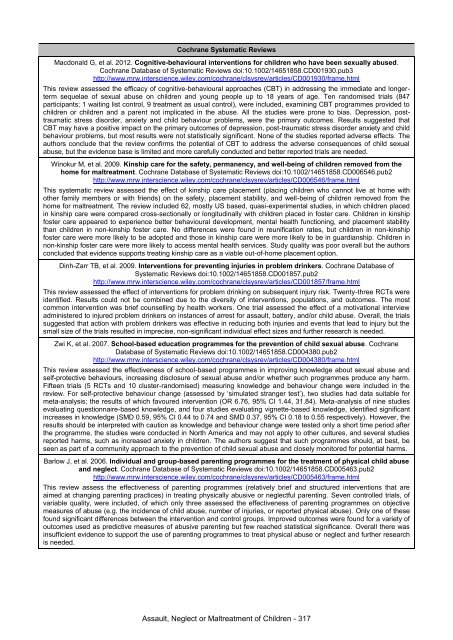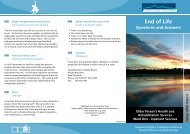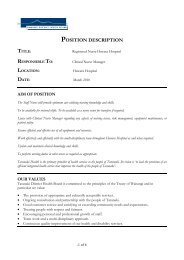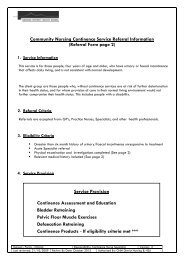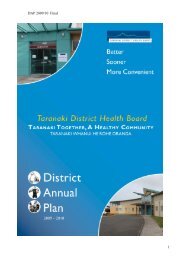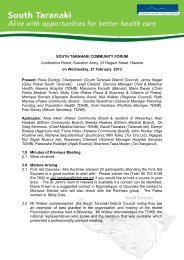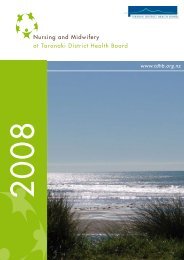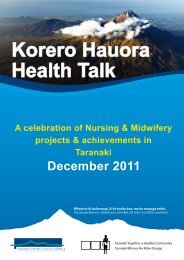This annual report - Taranaki District Health Board
This annual report - Taranaki District Health Board
This annual report - Taranaki District Health Board
- No tags were found...
You also want an ePaper? Increase the reach of your titles
YUMPU automatically turns print PDFs into web optimized ePapers that Google loves.
Cochrane Systematic ReviewsMacdonald G, et al. 2012. Cognitive-behavioural interventions for children who have been sexually abused.Cochrane Database of Systematic Reviews doi:10.1002/14651858.CD001930.pub3http://www.mrw.interscience.wiley.com/cochrane/clsysrev/articles/CD001930/frame.html<strong>This</strong> review assessed the efficacy of cognitive-behavioural approaches (CBT) in addressing the immediate and longertermsequelae of sexual abuse on children and young people up to 18 years of age. Ten randomised trials (847participants; 1 waiting list control, 9 treatment as usual control), were included, examining CBT programmes provided tochildren or children and a parent not implicated in the abuse. All the studies were prone to bias. Depression, posttraumaticstress disorder, anxiety and child behaviour problems, were the primary outcomes. Results suggested thatCBT may have a positive impact on the primary outcomes of depression, post-traumatic stress disorder anxiety and childbehaviour problems, but most results were not statistically significant. None of the studies <strong>report</strong>ed adverse effects. Theauthors conclude that the review confirms the potential of CBT to address the adverse consequences of child sexualabuse, but the evidence base is limited and more carefully conducted and better <strong>report</strong>ed trials are needed.Winokur M, et al. 2009. Kinship care for the safety, permanency, and well-being of children removed from thehome for maltreatment. Cochrane Database of Systematic Reviews doi:10.1002/14651858.CD006546.pub2http://www.mrw.interscience.wiley.com/cochrane/clsysrev/articles/CD006546/frame.html<strong>This</strong> systematic review assessed the effect of kinship care placement (placing children who cannot live at home withother family members or with friends) on the safety, placement stability, and well-being of children removed from thehome for maltreatment. The review included 62, mostly US based, quasi-experimental studies, in which children placedin kinship care were compared cross-sectionally or longitudinally with children placed in foster care. Children in kinshipfoster care appeared to experience better behavioural development, mental health functioning, and placement stabilitythan children in non-kinship foster care. No differences were found in reunification rates, but children in non-kinshipfoster care were more likely to be adopted and those in kinship care were more likely to be in guardianship. Children innon-kinship foster care were more likely to access mental health services. Study quality was poor overall but the authorsconcluded that evidence supports treating kinship care as a viable out-of-home placement option.Dinh-Zarr TB, et al. 2009. Interventions for preventing injuries in problem drinkers. Cochrane Database ofSystematic Reviews doi:10.1002/14651858.CD001857.pub2http://www.mrw.interscience.wiley.com/cochrane/clsysrev/articles/CD001857/frame.html<strong>This</strong> review assessed the effect of interventions for problem drinking on subsequent injury risk. Twenty-three RCTs wereidentified. Results could not be combined due to the diversity of interventions, populations, and outcomes. The mostcommon intervention was brief counselling by health workers. One trial assessed the effect of a motivational interviewadministered to injured problem drinkers on instances of arrest for assault, battery, and/or child abuse. Overall, the trialssuggested that action with problem drinkers was effective in reducing both injuries and events that lead to injury but thesmall size of the trials resulted in imprecise, non-significant individual effect sizes and further research is needed.Zwi K, et al. 2007. School-based education programmes for the prevention of child sexual abuse. CochraneDatabase of Systematic Reviews doi:10.1002/14651858.CD004380.pub2http://www.mrw.interscience.wiley.com/cochrane/clsysrev/articles/CD004380/frame.html<strong>This</strong> review assessed the effectiveness of school-based programmes in improving knowledge about sexual abuse andself-protective behaviours, increasing disclosure of sexual abuse and/or whether such programmes produce any harm.Fifteen trials (5 RCTs and 10 cluster-randomised) measuring knowledge and behaviour change were included in thereview. For self-protective behaviour change (assessed by ‘simulated stranger test’), two studies had data suitable formeta-analysis; the results of which favoured intervention (OR 6.76, 95% CI 1.44, 31.84). Meta-analysis of nine studiesevaluating questionnaire-based knowledge, and four studies evaluating vignette-based knowledge, identified significantincreases in knowledge (SMD 0.59, 95% CI 0.44 to 0.74 and SMD 0.37, 95% CI 0.18 to 0.55 respectively). However, theresults should be interpreted with caution as knowledge and behaviour change were tested only a short time period afterthe programme, the studies were conducted in North America and may not apply to other cultures, and several studies<strong>report</strong>ed harms, such as increased anxiety in children. The authors suggest that such programmes should, at best, beseen as part of a community approach to the prevention of child sexual abuse and closely monitored for potential harms.Barlow J, et al. 2006. Individual and group-based parenting programmes for the treatment of physical child abuseand neglect. Cochrane Database of Systematic Reviews doi:10.1002/14651858.CD005463.pub2http://www.mrw.interscience.wiley.com/cochrane/clsysrev/articles/CD005463/frame.html<strong>This</strong> review assess the effectiveness of parenting programmes (relatively brief and structured interventions that areaimed at changing parenting practices) in treating physically abusive or neglectful parenting. Seven controlled trials, ofvariable quality, were included, of which only three assessed the effectiveness of parenting programmes on objectivemeasures of abuse (e.g. the incidence of child abuse, number of injuries, or <strong>report</strong>ed physical abuse). Only one of thesefound significant differences between the intervention and control groups. Improved outcomes were found for a variety ofoutcomes used as predictive measures of abusive parenting but few reached statistical significance. Overall there wasinsufficient evidence to support the use of parenting programmes to treat physical abuse or neglect and further researchis needed.Assault, Neglect or Maltreatment of Children - 317


